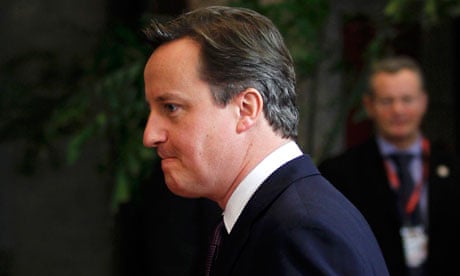Not since Margaret Thatcher gave the House of Commons her reaction – "No, no, no" – to calls from Europe for more integration 21 years ago has the belligerence of a UK prime minister been the subject of such heated debate and controversy. David Cameron's long night in Brussels is also threatening to rearrange British politics for years and transform the political dynamics of the Commons.
Thatcher's accusation that France and Germany were trying to create a "fortress Europe" marked the beginning of the end of her time in office. On Monday Cameron will face the Commons to explain his actions after an extraordinary few days during which, according to critics and supporters alike, he tore up the diplomatic rule book, disdained negotiations and deal-making, and encouraged the rest of the EU to make their own arrangements without the UK. In the words of one Tory MP, Cameron told Europe: "Enough is enough."
However, those closest to the prime minister understandably fear that this may well come to be regarded as a moment as ominous for Cameron as it proved for Thatcher.
During the prime minister's statement to the House, Cameron will present his actions, a spokesman insisted, not in a triumphalist spirit but as the "best that could be done". As the Observer reveals, the fury felt by the leader of the Liberal Democrats, the deputy prime minister, Nick Clegg, is real. For the future of the coalition, it is also, surely, highly dangerous. Sources close to Clegg have told of his disbelief that Cameron did not negotiate, "play for more time" in his so-called negotiations with Germany and France, but had arrogantly presented Britain's position as a "take it or leave it ultimatum".
Liberal Democrat chairman Tim Farron goes further: "Britain is in the mess it is in now and we got the appalling offer from France and Germany on Thursday as a consequence of the Tories being infantile about Europe and self-indulgent." Referring to the Eurosceptics who believe Cameron has done a great deal for the country, he told the Observer that "the image in my mind is the same position as Thelma and Louise", adding: "A wonderful glorious image of them escaping from the authorities, this marvellous happy ending together. Actually, no, you die in a ball of flames 30 seconds later. Obviously lots of people are going to be irritated by the claims that this is a victory for the Tory right. The reality is that it is a massive defeat for Britain.
"Liberal Democrats work to look to be the mature, stable heart of the coalition ensuring that Britain does not, in an infantile rash way, do something which is completely against its own interests."
The language being used by senior Lib Dems suggests that Cameron is gravely mistaken if he believes there can be a quick reversion to coalition business as usual. Many Lib Dems are as passionate about "Europe" as the most hardline Tory eurosceptic. And then there is Labour.
On Monday, Ed Miliband is likely to make hay with the divided coalition benches. He may mention the resignation speech by Thatcher's foreign secretary Geoffrey Howe when Howe complained that he had, all too often before a big summit, been like an opening batsmen who found his bat "had been broken before the game by the team captain". Labour MPs are desperately hoping this could be a moment for the Labour leader to shine.
Denis Macshane, Europhile MP for Rotherham, and former Labour Europe minister, said: "This is going to be one of the turning moments of British political history. A bit like the Corn Law reforms of the early 19th century, or the Irish question at the beginning of the 20th century.
"In the end, we are a small, medium- ranked power, but we have managed to have a great deal of influence because no meeting takes place about what happens in the world without Britain being present. I think the prime minister has thrown that object of British policy away and Labour needs to point this out."
A report from left wing thinktank Progress, compiled following interviews with former Labour foreign secretary David Miliband, Tony Blair's chief of staff Jonathan Powell, current shadow defence secretary Jim Murphy and a cast of other Labour experts in the field shows the way ahead, it claims.
Published on Monday, it says Labour must illustrate that the current anti-European sentiment across the political divide is fundamentally against Britain's long-term national interests. "Assuming we will be able to act bilaterally in an increasingly multipolar world is folly," it adds.
Labour, it says, must be the counterfoil to Cameron's apparent desire to turn Britain into the "Singapore of Europe". It claims that under Miliband, the party has not spoken out as the "internationalist" party as much as it could and should. Now, it says, is the time to do so.
"The lack of immediate clear response to these issues from the Labour party was seen, at best, to be politically expedient in the short-term and, at worst, as cowardly and politically lazy from a progressive pro-European party," authors Sam Hardy and James Denselow write.
They add: "Labour must fill the void left by the current government and grapple with the foreign policy agenda. This is not because it will necessarily be a key electoral issue, but because it is natural ground for Labour and a policy area for which the party has the time and space to lead the debate, project confidence and imagination in policy formulation, and ultimately prove its ability to govern."
Time, perhaps even this week, will tell if Labour is ready to rise to the challenge should the coalition fall.

Comments (…)
Sign in or create your Guardian account to join the discussion